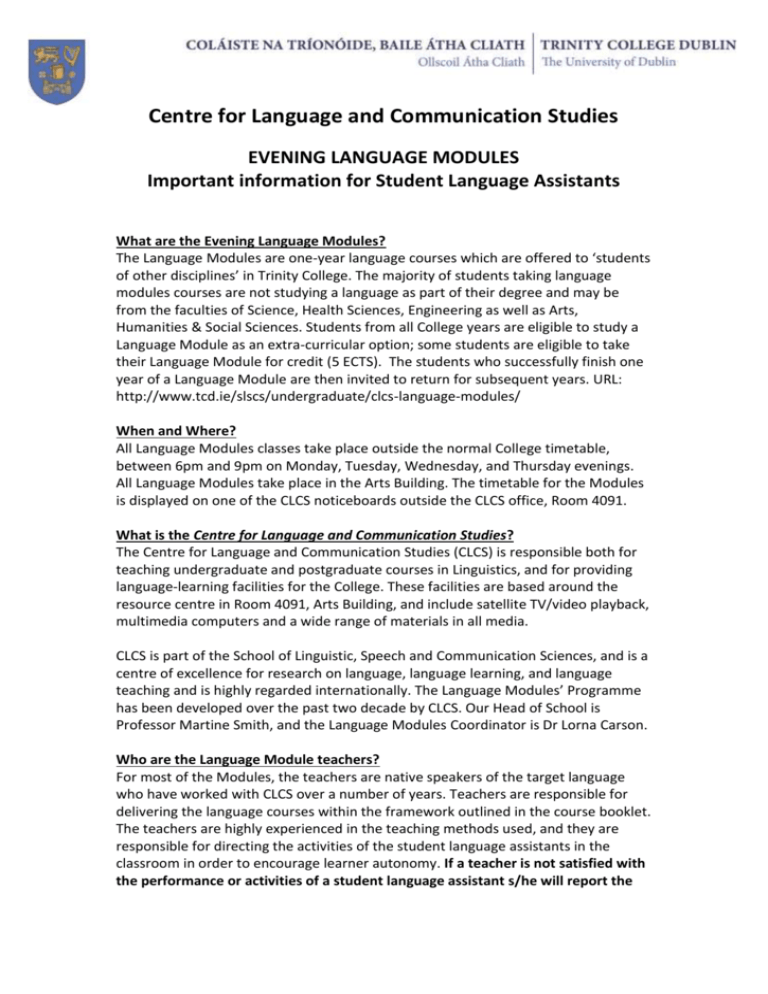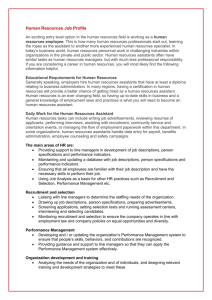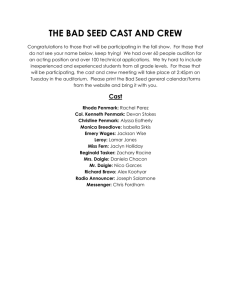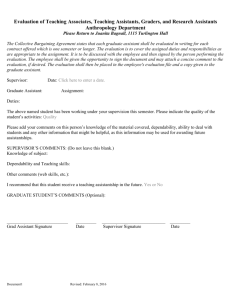Information on the native-speaker assistantships at CLCS.
advertisement

Centre for Language and Communication Studies EVENING LANGUAGE MODULES Important information for Student Language Assistants What are the Evening Language Modules? The Language Modules are one-year language courses which are offered to ‘students of other disciplines’ in Trinity College. The majority of students taking language modules courses are not studying a language as part of their degree and may be from the faculties of Science, Health Sciences, Engineering as well as Arts, Humanities & Social Sciences. Students from all College years are eligible to study a Language Module as an extra-curricular option; some students are eligible to take their Language Module for credit (5 ECTS). The students who successfully finish one year of a Language Module are then invited to return for subsequent years. URL: http://www.tcd.ie/slscs/undergraduate/clcs-language-modules/ When and Where? All Language Modules classes take place outside the normal College timetable, between 6pm and 9pm on Monday, Tuesday, Wednesday, and Thursday evenings. All Language Modules take place in the Arts Building. The timetable for the Modules is displayed on one of the CLCS noticeboards outside the CLCS office, Room 4091. What is the Centre for Language and Communication Studies? The Centre for Language and Communication Studies (CLCS) is responsible both for teaching undergraduate and postgraduate courses in Linguistics, and for providing language-learning facilities for the College. These facilities are based around the resource centre in Room 4091, Arts Building, and include satellite TV/video playback, multimedia computers and a wide range of materials in all media. CLCS is part of the School of Linguistic, Speech and Communication Sciences, and is a centre of excellence for research on language, language learning, and language teaching and is highly regarded internationally. The Language Modules’ Programme has been developed over the past two decade by CLCS. Our Head of School is Professor Martine Smith, and the Language Modules Coordinator is Dr Lorna Carson. Who are the Language Module teachers? For most of the Modules, the teachers are native speakers of the target language who have worked with CLCS over a number of years. Teachers are responsible for delivering the language courses within the framework outlined in the course booklet. The teachers are highly experienced in the teaching methods used, and they are responsible for directing the activities of the student language assistants in the classroom in order to encourage learner autonomy. If a teacher is not satisfied with the performance or activities of a student language assistant s/he will report the matter to the Course Co-ordinator and it will be necessary to ask that assistant to leave the Language Modules’ programme. What happens in a Language Modules’ class? The first thirty minutes/forty-five minutes/one hour of the class session is often delivered by the teacher alone. This period is used to address language learning issues as well as organisational matters. The Language Modules programme is based on a series of project cycles, which are carried out on a group basis. Students must organise themselves into working groups (usually 3 to 6 people) and must carry out the different stages of each project as outlined in the course handbook and on the project worksheet. The student language assistant usually joins the class for the second half of the session, when the students are working in their project groups. What is the role of the student language assistant? The assistant joins the class in the second half of the class session and is responsible for working with different student groups throughout that hour. It is important that the assistants circulate so that each group spends some time with a native-speaking assistant. The assistant can provide valuable information and support for the language learning activities of the students. For example: a native-speaker can suggest different vocabulary which would be more typically used; a native-speaker can suggest more accurate constructions; a native speaker can help with pronunciation and intonation. The question of pronunciation is a particularly important one, as it tends to be one of the weaker aspects of Irish students’ use of languages. Student assistants are asked to pay particular attention to pronunciation, particularly when the groups are preparing their oral presentations. On the other hand, the following must be observed – The assistant is not a teacher and must accept direction from the teacher, The assistant is not there to translate text etc. from English, The assistant must not do the work for the students – they are there to learn. When do assistants attend class sessions? Assistants are required to attend class during the weeks leading to a project presentation (teachers will confirm with individual assistants which weeks they require assistance in each term). Assistants are not required to attend class for the presentation. Therefore they attend during the ‘Project Work’ weeks. If they are required to attend at other times, the teacher will make arrangements on an individual basis. You will be expected to attend class on six occasions in each of the two terms. If you only work five weeks in one term, the missing week can be compensated in the next term. How and when are assistants paid? When students are offered positions as student language assistants, they are required to complete a form giving details of their bank account and address in Ireland. All student assistants must sign in weekly, in the attendance book, to confirm that they attended the class. This attendance book can be found at the desk in the CLCS office Room 4091. You need to go to this office to sign your name every time you come to class. Payment is made during the second term (depending on College holidays) directly into the assistant’s bank account. It is essential, therefore, that student language assistants set up a bank account in Ireland as soon as possible. The rate of payment for student language assistants is €10 per hour worked. In general, students are not required to pay tax on the earnings received as student language assistants. However, if any student is working elsewhere in the College, or outside Trinity College, then it is possible that his/her total earnings will be large enough to be liable for tax. The procedure for PPS numbers and tax forms There are two steps in dealing with tax in Ireland. Firstly, you need to obtain a PPS number. This you need to get from your local social welfare office, or Social Welfare Services Office, Apollo House, Tara St., Dublin 1. You need to bring a) Passport or Driving Licence, and b) a documentation of your Irish address, e.g. bill, rent book. If you have no other proof of address, my official letter offering you employment as a language assistant is sufficient – please ask me for a signed copy of this if necessary. Secondly, once you have the PPS number, fill in a form 12A (you can get a copy of this form on their web site at http://www.revenue.ie. In order to fill in the form 12A, you will need the following information PPS number: (you received this in the previous step – for Section A); Section C Name of Employer: Trinity College Dublin Address of Employer: Trinity College, College Green, Dublin 2 Telephone of Employer: 01 896 1000 Staff/Personnel No: not applicable Employer’s PAYE Registered Number: 00533701; (Trinity College’s Unit Number: 657) Employers Occupation: University; P.R.S.I. Class: your payment per hour, i.e. €10 Your occupation: language assistant Date commenced: 21 October 2013 (part-time) Pay frequency: monthly For more information . . . For additional information about the position of student language assistant on the CLCS Language Modules’ programme you can contact the CLCS Office: Room 4091, Arts Building E-mail: clcsinfo@tcd.ie Arts Building Tel: 01 893 1560 Please note that we cannot give individual advice on completing the 12A Form, or on obtaining a PPS number. You should consult the relevant government departments or the Citizens’ Information website: http://www.citizensinformation.ie ______________________________________________________________ Dr Lorna Carson Language Modules Coordinator






